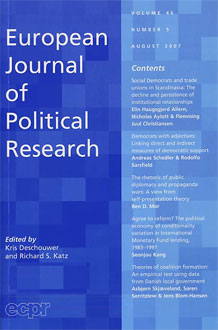Dealignment
Podcast : The Changing Relationship Between Voters And Parties
Ruth Dassonneville was interviewed for the podcast ‘How to Win Arguments with Numbers‘ of the Q-Step Centre at the University of Kent. In the podcast, she talks about the changing relationship between voters and parties in established democracies. To access and listen to the podcast, click here Read more

Electoral Volatility and Parties’ Ideological Responsiveness
Abstract For a number of decades now, scholars have been indicating that ties between citizens and parties are eroding. As a consequence, electoral behavior has become more volatile and also more unpredictable. The consequences of this process of change on parties’ strategic behavior have however received little attention. In this paper, I examine the impact […] Read more

Partisanship and Political Sophistication During and Outside of Election Times
Abstract In many established democracies, partisan attachments play a central role in guiding citizens’ attitudes as well as their political behaviour. Most importantly, partisanship has an effect on what party citizens vote for on Election Day. In general, highly politically sophisticated citizens are more likely to identify with a party compared to the less politically […] Read more

Indifference and Alienation
Abstract Within the literature, there is an ongoing debate on how to understand the broader implications of the process of electoral dealignment. While some authors argue that dealignment leads to a more ‘open’ electorate that ponders the options offered by the party system, other authors have argued that dealignment leads to a general alienation from […] Read more

Partisan Dealignment in Germany
Abstract The work of Russell Dalton has played a seminal role in the study of the relation between political sophistication and partisan dealignment. It has to be acknowledged furthermore that there is a consensus on the occurrence of a decline of partisanship in Germany. Using panel data as well as pooled cross-sectional observations, however, it […] Read more

Ontzuiling van kiesgedrag

Age, Period and Cohort Effects in the Decline of Party Identification in Germany
Abstract Party identification traditionally is seen as an important linkage mechanism, connecting voters to the party system. Previous analyses have suggested that the level of party identity is in decline in Germany, and this article first expands previous observations with more recent data. These suggest that the erosion of party identity continues up to the […] Read more